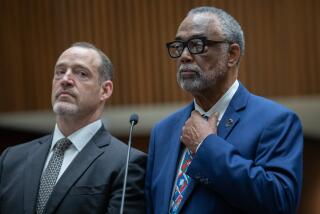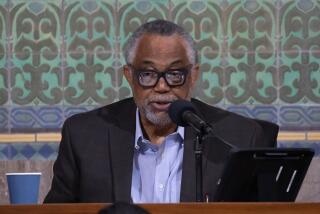Filner’s attorney asks City Council to pay mayor’s legal bills

SAN DIEGO — Mayor Bob Filner’s attorney asked that the City Council pay his legal bills as he fights allegations of sexual harassment.
The request came to the San Diego city attorney on Monday and will be considered in closed session by the council on Tuesday.
Seven of the nine council members have urged Filner to resign. Several have said that the city should not be forced to pay his legal fees because his alleged misconduct was not part of his official duties.
In the past, the city has paid several million dollars in legal fees for city officials in scandals involving illegal campaign contributions and the city’s pension deficit.
One of Filner’s former top aides has filed a sexual harassment lawsuit seeking unspecified damages. The aide said she was put repeatedly in the “Filner headlock” and told on one occasion to come to work without panties.
In announcing the lawsuit, Filner’s former director of communications, Irene McCormack Jackson, said she has seen Filner touch numerous women inappropriately.
Six other women have accused him of making unwanted sexual advances, including a retired Navy admiral, a San Diego State University dean, a leader in the city’s tourism industry and the head of a group of business owners who are tenants of the San Diego Port District.
The city attorney’s office has said it cannot represent Filner because the city also is a defendant in the lawsuit.
Filner has rejected calls to resign and said that although his behavior toward women was unacceptable, he does not believe that he has committed sexual harassment.
He has hired Harvey Berger, one of the city’s top employment lawyers, to help him fight the allegations.
Meanwhile, two groups are vowing to force a recall election that could oust Filner, but the city’s recall law is fraught with legal questions.
Among the questions is whether there can be two recall efforts at the same time seeking to gather the signatures necessary to force an election.
A spokesman for City Atty. Jan Goldsmith said the office is researching the issue and plans to issue an opinion within a few days.
Filner is facing an increasing number of calls for his resignation amid allegations that he has sexually harassed constituents and staff members.
The 70-year-old Democrat has refused to resign but promised to enter a two-week course of intensive behavioral therapy starting Aug. 5.
One of the recall groups, led by land surveyor Michael Pallamary, filed an affidavit Monday with the city clerk indicating its plans to begin a petition-gathering campaign.
A second group, led by Stampp Corbin, owner/publisher of an LGBT newspaper, published an advertisement on the weekend indicating a similar plan.
Corbin was immediately criticized by anti-Filner activists who say that he is actually trying to protect Filner by launching an effort that will block a real recall campaign.
To qualify a recall effort for the ballot, a campaign must gather 101,597 signatures of registered voters.
The city’s recall law is also being questioned by City Councilman Mark Kersey, who says it is inconsistent with a court ruling striking down part of the state law involving recalls.
Kersey, who is among the seven members of the council who want Filner to resign, has asked that the matter be brought to the council so that the section can be repealed.
City law needs to be changed, Kersey said, so that “voters may have confidence in the legal viability of future [recall] elections.” In a recall, the ballot asks about recalling the incumbent and then lists candidates seeking to be the replacement.
Kersey noted that a provision in the city rules says that “no vote cast for a candidate shall be counted unless the voter also voted on the recall question.” A similar rule in state law for state recalls was struck down by the courts in 2003, he said.
Even if legal problems are eliminated, recall remains a difficult process. Political analysts doubt that a volunteer-only group can gather enough signatures.
tony.perry@latimes.com
More to Read
Start your day right
Sign up for Essential California for news, features and recommendations from the L.A. Times and beyond in your inbox six days a week.
You may occasionally receive promotional content from the Los Angeles Times.






